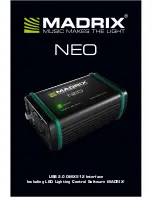
4.1.
ADJUSTING THE FIT OF THE HELMET (SEE FIG.1)
4.1.1.
The circumference of the headband is adjusted by turning the wheel on the rear.
4.1.2.
The two top straps can also be adjusted by releasing the pin from the top strap and adjusting as required.
4.1.3.
The distance between the headband assembly and the helmet can be adjusted by undoing the external thumbwheels both sides
and sliding the headband assembly forwards or backwards, as required. Re-tighten the thumbwheels. (See figs.1 and 2.)
4.1.4.
Test the fit of the helmet by lifting it up and closing it a few times whilst wearing it. If the headband moves whilst tilting, readjust it
until it is stable.
4.2.
ADJUSTING THE HELMET TILT (SEE FIG.3)
4.2.1.
If the visor is too low when the helmet is in the lowered position, adjust the tilt of the helmet in relation to the headband.
4.2.2.
Referring to fig.2, loosen the external thumbwheels and lift the tab up to move it to make the helmet tilt up further or to tilt down
further. Then re-tighten the external thumbwheels.
5. MAINTENANCE
5.1.
CHANGING THE VISOR
5.1.1.
Release the stud from the body of the brow guard (fig.4).
5.1.2.
Release the two clips from under the vent (fig.5).
5.1.3.
The visor will swivel on the two visor pegs and can be gently pulled free from the body
of the brow guard (fig.6).
5.1.4.
To install the new visor reverse the above process.
5.2.
CLEANING AND DISINFECTION
8
DO NOT
use abrasive materials.
5.3.
Materials used: lens PC, frame for face shield PA, frame cover plate PC, headgear PE.
5.3.1.
The face shield can be cleaned with soap and warm water, or with ordinary household
disinfectant.
5.3.2.
The lens is not scratch resistant. Be very careful when wiping, keep this to a minimum
and use a soft, non-friction cloth.
5.4.
INSPECTION
5.4.1.
Eye-protectors should be periodically inspected and cleaned. If it is damaged , pitted or
anything that seriously affects the vision through it, the lens/faceguard must be
replaced.
6. STORAGE
6.1.
Good storage conditions are very important for the service life of face shield. It
should be stored at temperatures higher than 5°C and lower than 40°C and 90%
relative humidity. It should be kept away from solvents, solvent vapours or any
corrosive materials, because the protection effect of face shield may be seriously
reduced.
6.2.
It is recommended that you put it in a protective bag or box when not in use and
store them in a safe place.
6.3.
Product life 2 years.
fig.2
fig.3
fig.4
fig.5
Original Language Version
© Jack Sealey Limited
Note
: It is our policy to continually improve products and as such we reserve the right to alter data, specifications and component parts without prior
notice. Please note that other versions of this product are available. If you require documentation for alternative versions, please email or call
our technical team on [email protected] or 01284 757505.
Important
: No Liability is accepted for incorrect use of this product.
Warranty
: Guarantee is 12 months from purchase date, proof of which is required for any claim.
Sealey Group, Kempson Way, Suffolk Business Park, Bury St Edmunds, Suffolk. IP32 7AR
01284 757500
01284 703534
www.sealey.co.uk
ENVIRONMENT PROTECTION
Recycle unwanted materials instead of disposing of them as waste. All tools, accessories and packaging should be sorted, taken to
a recycling centre and disposed of in a manner which is compatible with the environment. When the product becomes completely
unserviceable and requires disposal, drain any fluids (if applicable) into approved containers and dispose of the product and fluids
according to local regulations.
fig.6
S
SP78.V2, SSP78.V2R Issue 1 05/08/2020




















